Tampa Bay is closing in on a record held by 1987 'Team Streak' Milwaukee Brewers
The Tampa Bay Rays are getting closer and closer to baseball history, now 11-0 to start the 2023 season. That ties them for the second-most wins to open a season in American League history (1981 Oakland Athletics) and moves them two wins closer to the overall record, shared by the 1982 Atlanta Braves and, of course, the 1987 Milwaukee Brewers.
The Brewers' 13-game winning streak to start the year kicked off a wild season that has to rank as one of the craziest regular seasons in Wisconsin sports history, especially for a team that didn't make the postseason.
Milwaukee finished the year with 91 wins, but the journey was a rollercoaster, with a 12-game losing streak, a 39-game hitting streak, a 32-inning scoreless inning streak from one star pitcher and a performance that remained the lone no-hitter in franchise history until 2021.
Here's what to know about the streak
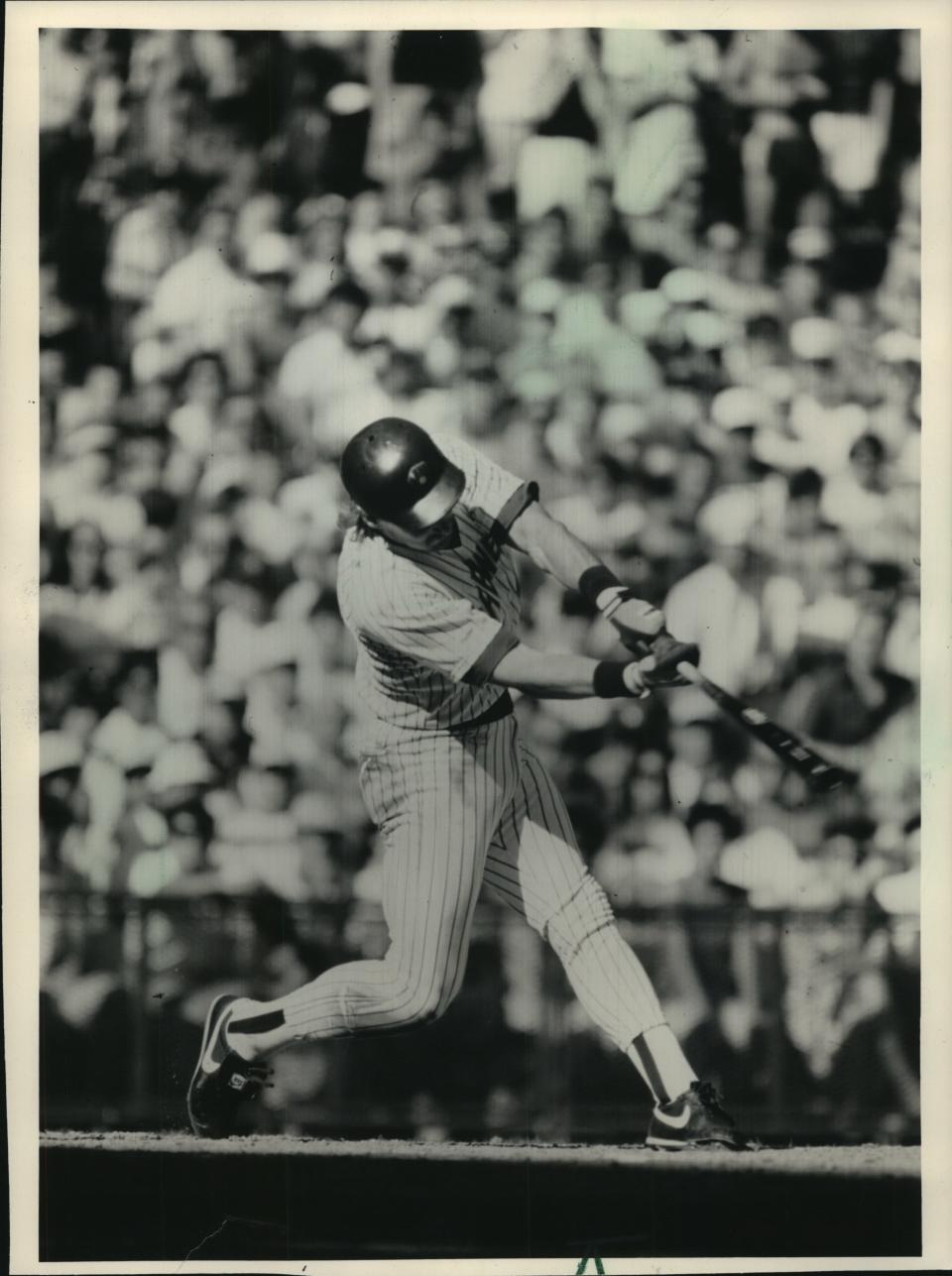
Everyone remembers Game No. 12 (Easter Sunday)
Most every Brewers fan of a certain age associates "Easter Sunday" with the 1987 Brewers. Down 4-1 heading into the ninth April 19, 1987, the 30,000 Brewers fans on hand at unseasonably warm County Stadium (no, it wasn't a sellout, nor was it close to one) gave the Brewers a rousing ovation as they retired the Texas Rangers in the top of the ninth and regrouped for one final shot.
Glenn Braggs walked, Greg Brock softly singled against lefty Mitch Williams, with Rick Manning taking Brock's place on the basepaths. Williams, who had retired seven batters heading into the ninth, induced a flyout from Cecil Cooper, and Valentine made the decision to switch pitchers for the right-handed swinging Deer. In came breaking-ball specialist Greg Harris.
Deer swung and missed at the first curveball he saw. The second was deposited 450 feet with the wind blowing in for one of the most uplifting homers in Brewers history, a three-run bomb that tied the game.
"I just saw it," Deer said at the time. "Soooo big. I don't remember running the bases. I got back to the on-deck circle, and everybody was jumping all over me."
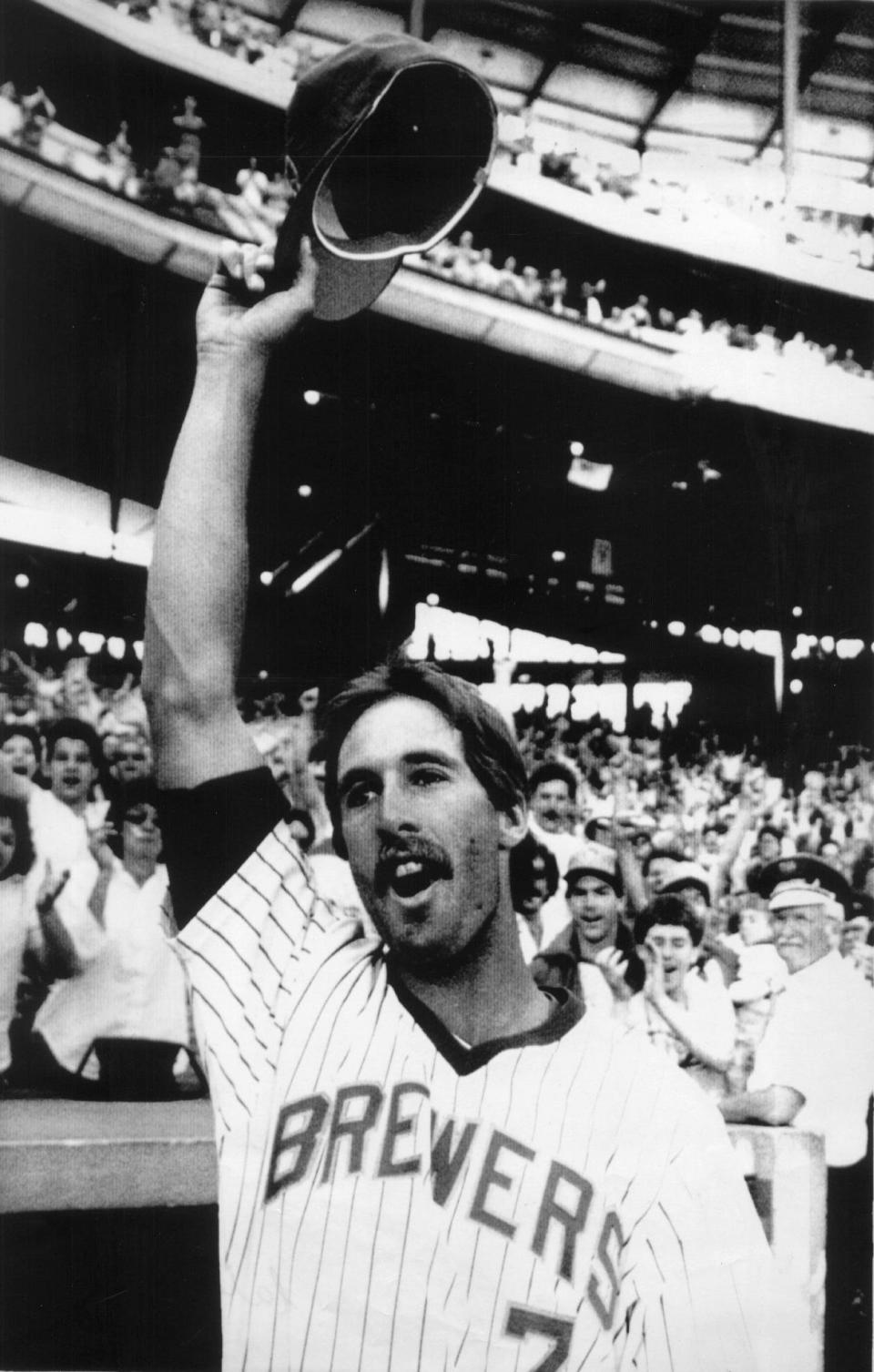
Brewers Podcast: A look back at 1987's 'Team Streak' with Tom Haudricourt
Brewers Podcast: Dale Sveum looks back at the insane 1987 Brewers season and the 2008 return to the postseason
"Jiminy Christmas, that ball got small in a hurry," Brewers manager Tom Trebelhorn said afterward.
BJ Surhoff, a rookie catcher whose single in the seventh marked a seven-game hitting streak to start his career, struck out, but Jim Gantner walked with two outs. That brought up Dale Sveum, who ambushed a high fastball from Harris and sent the Brewers to a frenzied 6-4 win and 12th consecutive victory to open the year.
"It's hard to explain," Deer said. "This is the greatest day of my life. This is the funnest game I've ever played in. It's just hard to explain."
Everyone remembers Game No. 9 (the no-hitter)
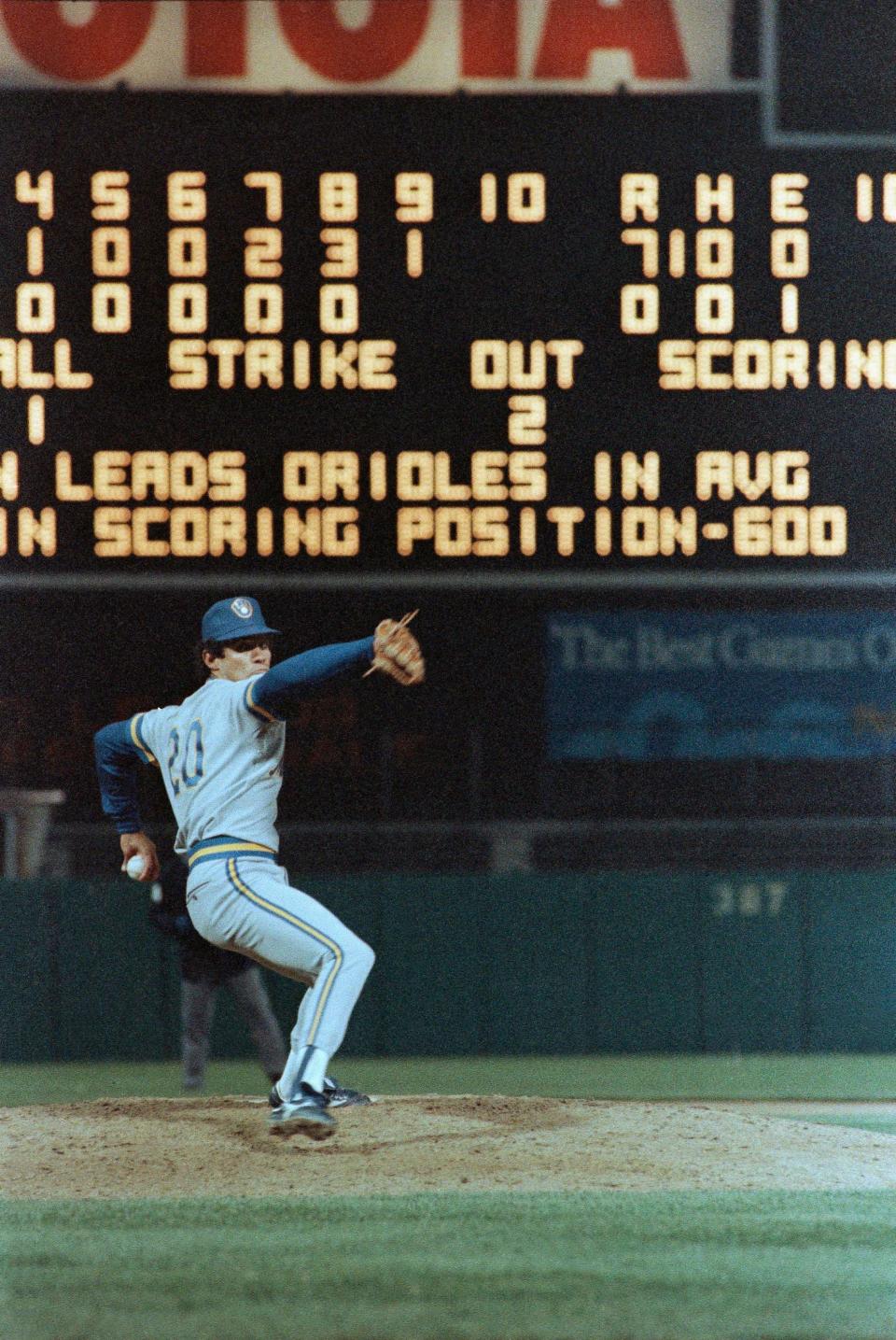
It's almost crazy to think that another massive franchise moment had taken place just four days earlier when Juan Nieves threw the first no-hitter in franchise history, and still the only non-combined no-no.
Playing in Baltimore, the Brewers rolled to a 7-0 win behind the young Nieves, and when Robin Yount made a famous diving catch for the 27th out, the 22-year-old second-year player had accomplished something that's never been matched in franchise history.
One potentially forgotten hero: rookie Jim Paciorek. Playing in lieu of Rob Deer, who was out with a wrist injury, Paciorek recorded his first big-league hit with a double in the seventh. But he also made a full-extension diving catch in the outfield that kept the no-hitter intact; it just happened to take place in the second inning before anyone knew history would be made. Sveum, whose homer in the fourth inning kicked off the scoring, also made a slick play in the field.
Paciorek and Yount both made their catches against the same batter, Hall of Famer Eddie Murray.
It was Paciorek's only season in the big leagues; he played in 48 games. (The highlight above incorrectly identifies him as Tom, his brother who played 18 big-league seasons).
What else happened during the streak?
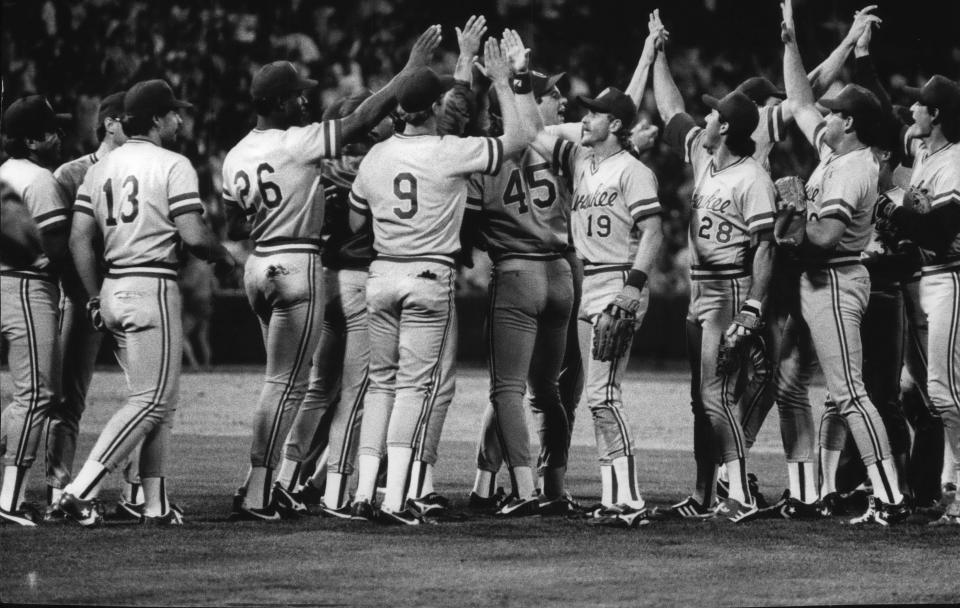
Perhaps what made the Easter Sunday moment so special was the series of wild events that transpired on the 13-game streak. Or maybe it was the burgers. More on that in a minute.
Paul Molitor led off the season with a triple at County Stadium, and Teddy Higuera threw seven shutout innings in a 5-1 win over the Red Sox in the opener.
Billy Jo Robidoux's RBI single in the seventh snapped a 2-2 tie in a 3-2 win over Boston two days later in Game 2.
In Game 3, Rob Deer hit two three-run homers to help Milwaukee erase an early 4-0 deficit, though Boston rallied back from five runs down to tie the game at 11. Surhoff's first home run provided the difference in a 12-11 win.
The Brewers scored eight runs in the first inning of Game 4 and beat Texas, 11-8. Milwaukee scored eight runs in an inning in Game 5, too, in the eighth inning of an 8-6 win over the Rangers.
Milwaukee lost a three-run lead in the 11th inning of Game 6, but Surhoff's bases-loaded single in the 12th snapped the tie and the Brewers beat Texas, 7-5.
In Game 7, the Brewers scored twice in the eighth to break a tie and beat Baltimore, 6-3. Cecil Cooper had the go-ahead sacrifice fly in his first game off the injured list.
In Game 8, Molitor led off the game with a homer and the Brewers homered five times in a 7-4 win over Baltimore.
Game 9 was the no-hitter. In Game 10, the Brewers trailed 1-0 in the sixth but scored seven runs in the seventh and prevailed, 10-2.
In Game 11, the Brewers beat Texas, 4-3, and matched Oakland for the best start in American League history.
Game 12 was Easter Sunday. In Game 13, the Brewers edged the White Sox, 5-4, in the first Nieves start since his no-no.
Everyone had George Webb burgers
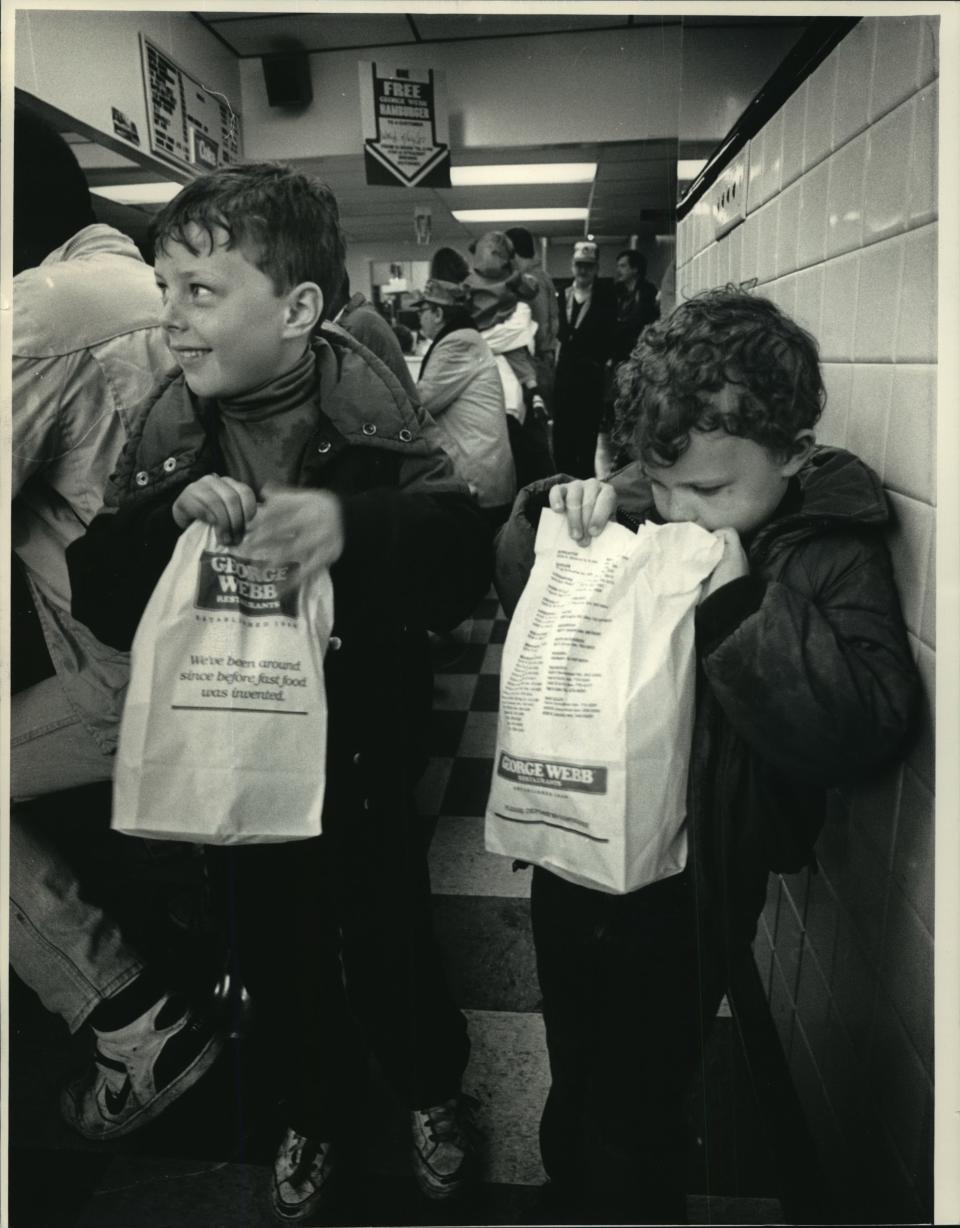
The 12th win triggered a long-running promotion from local restaurant chain George Webb, which promised free burgers to patrons if the Brewers won 12 straight games.
Radio stations like WKTI pledged to broadcast for a six-hour window the following Wednesday live from a George Webb restaurant on 76th Street. WLZR even gave away free hamburgers to the first 103 diners on Monday, two days before the promotional giveaway, at a George Webb on Layton Avenue.
It continues to be one of the most-discussed promotions in greater Milwaukee. The Brewers weren't able to reach the 12-win threshold again until 2018, when a late-season winning streak into the playoffs fed the fans yet again.
In 1987, Milwaukee fans flooded hotlines for tickets to the Monday night game at Comiskey Park in Chicago, and those who traveled south saw the streak extend to 13, tying Atlanta for the MLB record.
The rest of the season was just as zany, with Molitor and Higuera's streaks back-to-back
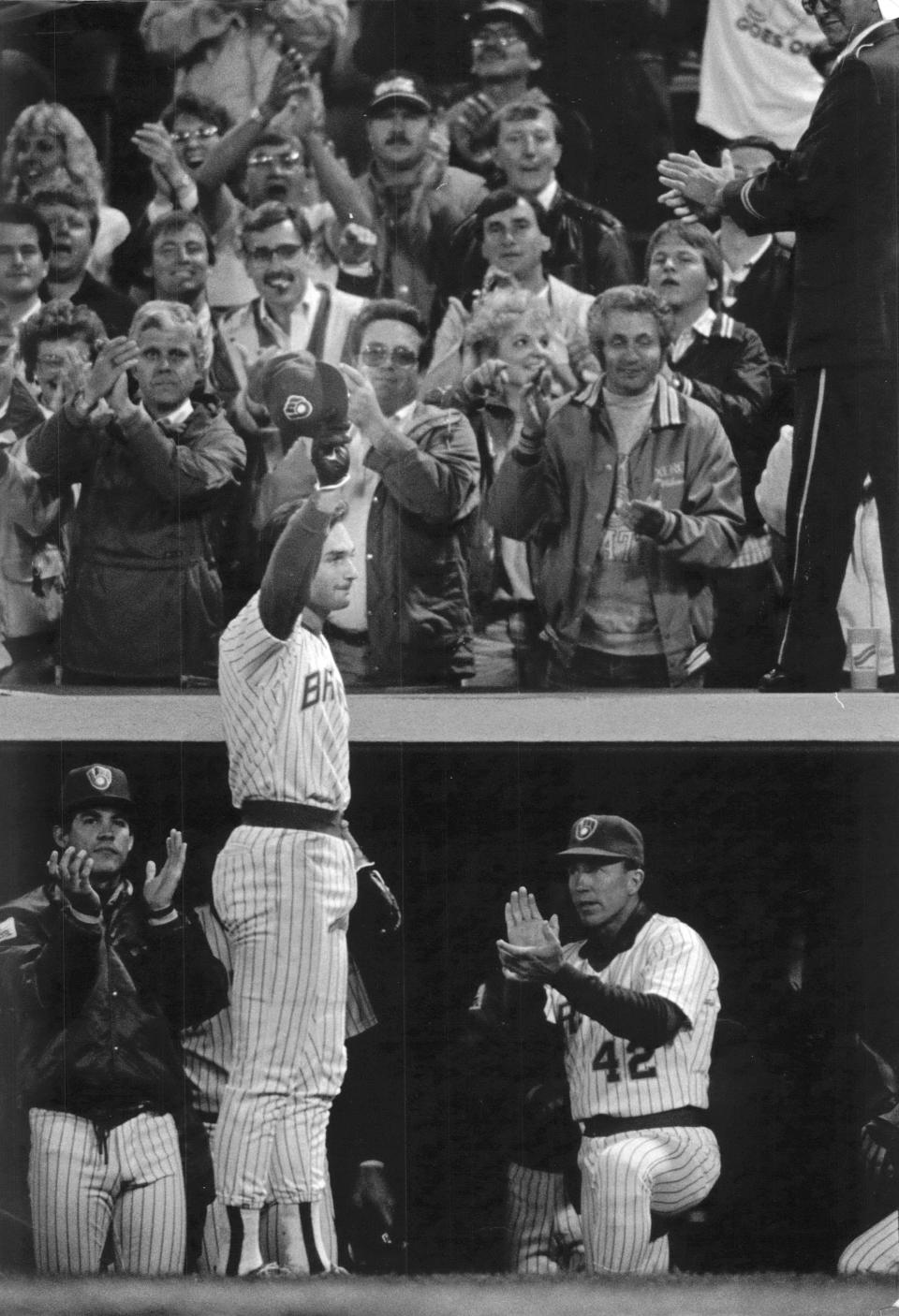
The arc of the season sounds like a work of fiction.
Milwaukee began the season 20-3, then lost 12 consecutive games. It's actually even worse; after winning the next two and finally breaking up the bad vibes, Milwaukee lost the next six after that to fall to 22-21. The Brewers then won the next six in a row! But by the time the all-star break rolled around, Milwaukee was 42-43, a mind-boggling 11 games out of first place.
But "Team Streak" was still in the process of earning its nickname.
The magic started immediately after the all-star break July 16, when Paul Molitor doubled in the second inning against Kirk McCaskill of the Angels. Molitor, in his first game off the injured list, simply never stopped hitting. He ran his hitting streak to 39 games, a mark that hasn't been matched in MLB since (Jimmy Rollins of Philadelphia reached 38 games in 2006).
Molitor's streak ended in strange infamy Aug. 26. The Brewers defeated Cleveland, 1-0, when pinch hitter Rick Manning drove in speedy Mike Felder on a soft single in the 10th, giving the Brewers a nail-biting victory … and fans booed. Molitor, standing on deck when Manning delivered the hit, was the first one to greet the night's hero, but Brewers fans were crestfallen that Molitor didn't get one last shot to reach 40 games. He finished the night 0 for 4.
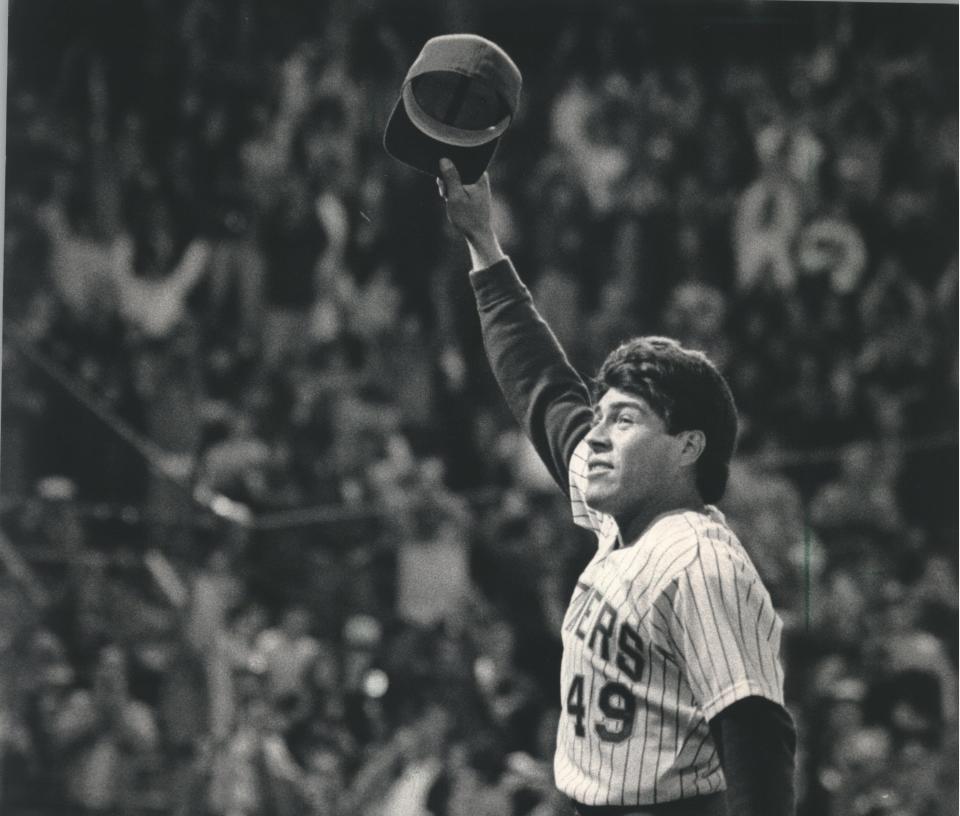
But one streak ending marked another's beginning. The Brewers shut out Cleveland thanks to 10 innings of work from Teddy Higuera (three hits, 10 strikeouts). In his next start, Higuera lost a no-hitter with two outs in the eighth but settled for the complete-game 1-hitter in a shutout of Kansas City, and he followed with a complete-game two-hitter against Minnesota for his third straight shutout.
It took a two-out home run by Detroit's Tom Brookens in the fifth of Higuera's next start to finally break the spell; Higuera's 32-inning consecutive scoreless streak is still a franchise record.
But the Brewers still didn't make the playoffs despite 91 wins
Through the remarkable ups and downs, the Brewers still weren't a playoff team, never getting closer than 6 games of first place in the American League East in the second half. The 91 wins were only good for third place, with Detroit (98-64) and Toronto (96-66) ahead. Only Detroit advanced to the postseason under the playoff format of the era, while 85-win Minnesota won the West and went on to win the World Series, and 90-win San Francisco also advanced to the NLCS.
The 1982 Braves that also started with 13 straight wins only won 89 games that season but still got to play in the NLCS.
More: The top 25 walk-off home runs in Brewers history
Our subscribers make this reporting possible. Please consider supporting local journalism by subscribing to the Journal Sentinel at jsonline.com/deal.
DOWNLOAD THE APP: Get the latest news, sports and more
This article originally appeared on Milwaukee Journal Sentinel: Tampa Bay Rays closing in on 1987 Team Streak Brewers wins record

